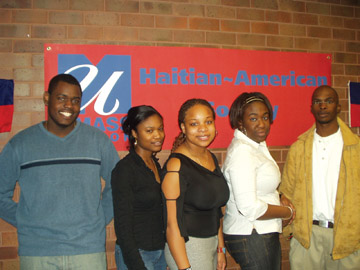The Haitian-American Society of UMass Boston held an open house on Tuesday, November 4 in the Wheatley student lounge. Patrice Raeeau, its articulate and welcoming president, said of the HAS, “We’re like a family. We’re concerned with promoting Haitian culture and an understanding of it, and doing what we can to help. We want to make changes, help to rebuild schools [in Haiti] and get books.”
Raeeau is majoring in biology at UMB. After obtaining her degree this academic year, she intends to go to Springfield for training as a physician’s assistant. “I’m a people person, a helping person, and that’s what I want to do,” she stated. Although she was born in the United States, Raeeau’s parents emigrated from Haiti.
Vice President of the HAS and second generation Haitian-American Bethanie Petitfrere said, “The Haitian-American Society was founded by Haitians, but everyone is welcome, either as a member or as a guest at social events.” This was evidenced by the great variety of ethnicities present and participating in Tuesday’s celebration.
“We have the bicentennial of Haiti’s independence coming up next year,” she continued. “That’s a big deal. Everyone will be welcome for that, too. It will be a nice celebration, a Tchaka night with dancing and singing.”
Tchaka is a genre of contemporary music akin to reggae, and is highly syncopated, insistent, compelling, and an invitation to dance. It is a derivative of the more traditional troubadoa music and song of Haiti.
Petitfrere also discussed troubled times in Haiti’s past, particularly the reign of Francois “Papa Doc” Duvalier and his son Jean-Claude, “Baby Doc” Duvalier. The dreaded Tontons Macoute (“boogey men”) of the Duvalier regimes carried out terrorist acts, including torture and assassination, against the populace to suppress any sign of political dissent. Jean-Claude was overthrown in 1986 and now lives in exile in Paris. She noted that many believe the Duvaliers’ regimes were tacitly supported by U.S. agencies such as the CIA. “Haiti,” she added, “needs a president who is for the people of Haiti.”
Food in the Haitian culinary tradition was plentiful at the HAS event. Fried chicken that would make the Colonel envious, tangy meat pies, crisply fried plantains, and fresh watermelon, strawberries and pineapple were served. Rice, its seasoning ranging from subtle to fiery, often mixed with black beans, was also available. Rice came to Haiti from West Africa with the slaves who would later found the country.
The island nation of Haiti is located in the Caribbean Sea between Puerto Rico and Cuba. It occupies the western half of Hispaniola, the eastern portion of the island being occupied by the Dominican Republic.
The slave population founded Haiti in 1804 following the overthrow of French colonialists. The revolt was led by former slave Toussaint L’Overture, who is renowned for his audacity and courage in the face of overwhelming odds. He defeated Napoleon’s finest generals and freed the island from colonial rule. The Haitian Revolution is recognized as one of the most determined, daring, and also the bloodiest in history.
Haiti, though troubled by a lack of infrastructure for such institutions as schools and health care, is also a country with a dramatic and compelling history and areas of striking natural beauty.

